|
De Nederlandse dichter en schrijver Willem Kloos werd
geboren in Amsterdam op 6 mei 1859. Zie ook alle tags voor Willem Kloos op dit
blog.
Zelf-verandering
Ik
ben te veel een mens geweest,
Een mens, die gilde en klaagde en schreide,
Die dronk zijn glas en vierde feest
En diep-gevoelde dingen zeide.
Nú ben k een delicaat artiest,
Verliefde van zijn fantasieën,
Maar die zich t allerliefst verliest
In zijn kokette melancholieën
Melancholie-om wie? om wat?
Ik weet niets meer, kan niets meer voelen
Dan zoet gespeel met dit en dat
Van rijmen, zachte, klare, koele.
Geen
tranen zullen op mijn graf-stee vallen
Geen tranen zullen op mijn graf-stee vallen,
Maar lachen onderdrukt-half, of zacht-luid,
En vele mensen zullen vuisten ballen
Tegen dit mens, dat dan niets meer beduidt.
Zij zullen elkaar aanstoten in zacht mallen
Om mij, arm mens, die sprak zó hooglijk-luid
In 't Leven Mijn, die leefde van geluid
Alleen, en van veel opstaan na veel vallen.
O 't Leven is één Melancholie
Van veel verlangen en veel krijgen, om weer
Te grijpen naar het aller-onverkrijgbaarst,
Hoog in de wolken zwemend, onbereikbaarst
Geluk. Geluk? O Mens, wat zijt gij dom weer:
Heel 't Leven is Eén reine Melodie.
Infernale
impressies
De gekken zitten in hun kerkgebouw
Als stomme mummiën: met stenen ogen
Staren ze onwendbaar langs de lage bogen
En horen van Geloof en Liefde en Trouw
Uit 's herders mond, die kalmpjes staat en nauw
Iets hoorbaars voor een oirbaar mens kan pogen
Te geven aan de onzaal'gen, die bedrogen
Om 's werelds eêlste goed, zien lauw en flauw.
Dan kerend zaal-waarts naar mijn vreemde voêr,
Denk ik gedwee: 'k ben een verloren worm maar,
En ga dan stil wat schrijven of wat lezen.
Maar mèt begint het hortende rumoer,
Lawaaiend langs de wanden of 't een storm waar...
Mensen, aanschouw: ik word als een van dezen.
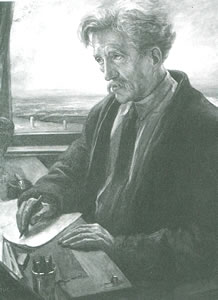
Willem Kloos (6 mei 1859 31 maart 1938)
De Chileens-Amerikaanse toneelschrijver, essayist,
dichter, novellist, cartoonist Ariel Dorfman werd op 6 mei 1942 in Buenos Aires
geboren. Zie ook alle tags voor Ariel Dorfman op dit blog.
Uit: The
Nanny and the Iceberg
There's a reason why I've refused to show you
my face, to meet you when you've come to New York to visit. The first thing you
asked for when we reconnected through the Internet. "Send me a photo,
please send me a photo, to see how much you've changed since I left for
Seattle." What I didn't want you to know is that it hasn't changed. Not at
all. That it's the same face you last saw walking out the door of your parents'
house nine years ago. At twenty-four, I look like I'm still fifteen. Easy to
deceive you, tell you I looked thirty, thirty-five.
Not the only lie. I'm not American. Fooled you
when we first met, when we almostand kept on fooling you when we hooked up
again to couple in cyberspace. Didn't want you to know I was Chilean. I came
here from Chile when I was five. Me and my mother. Exiled. That's the mystery
country I returned to eighteen months ago. That long dagger of a country on the
Pacific Ocean. Means the end of the world in Quechua, Chile does. Even the
Peruvian Indians thought it was too far away, too inaccessible and destitute to
be conquered. Driest desert on earth, the Atacama, to the north; the Andes
forbidding safe passage to the east; to the west that ocean, with no land for
thousands of miles, except for the tiny isle of Juan Fernández, where poor
Robinson Crusoe was shipwrecked, and Easter Island and then nothing until
Polynesia. And to the south ... I went there, to the mythical continent south
of the south, first to Patagonia, then to Antarctica: I went to the white
continent that for most of humanity's history did not even exist on a map. Only
in dreams. I watched an iceberg being hacked from that floating mountain in
Paradise Bay as the snow flurries licked my face and I tricked my father into
telling me how he had fucked more women on this planet than any other man
alive. As we watched that ice nobody had ever seen before in human history.
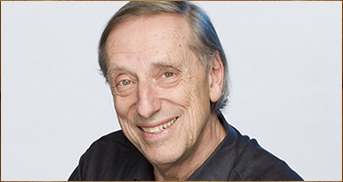
Ariel Dorfman (Buenos
Aires, 6 mei 1942)
De Oostenrijkse dichter, schrijver, essayist en
vertaler Erich Fried werd
geboren op 6 mei 1921 in Wenen. Zie ook alle tags voor Erich Fried op dit
blog.
Kein Unterschlupf
Nicht sich verstecken
vor den Dingen
der Zeit
in die Liebe
Aber auch nicht
vor der Liebe
in die Dinge
der Zeit
Traurigkeit die jeder kennt
Man weiß von vornherein, wie es verläuft.
Vor morgen früh wird man bestimmt nicht munter.
Und wenn man sich auch noch so sehr besäuft:
die Bitterkeit, die spült man nicht hinunter.
Die Trauer kommt und geht ganz ohne Grund.
Und angefüllt ist man mit nichts als Leere.
Man ist nicht krank. Und ist auch nicht gesund.
Es ist, als ob die Seele unwohl wäre.
Man will allein sein. Und auch wieder nicht.
Man hebt die Hand und möchte sich verprügeln.
Vorm Spiegel denkt man: "Das ist dein
Gesicht?"
Ach, solche Falten kann kein Schneider bügeln.
Vielleicht hat man sich das Gemüt verrenkt?
Die Sterne ähneln plötzlich Sommersprossen.
Man ist nicht krank. Man fühlt sich nur gekränkt.
Und hält, was es auch sei, für ausgeschlossen.
Man möchte fort und findet kein Versteck.
Es wäre denn, man ließe sich begraben.
Wohin man blickt, entsteht ein dunkler Fleck.
Man möchte tot sein. Oder Gründe haben.
Man weiß, die Trauer ist sehr bald behoben.
Sie schwand noch jedes Mal, so oft sie kam.
Mal ist man unten, und mal ist man oben.
Die Seelen werden immer wieder zahm.
Der Eine nickt und sagt: "So ist das
Leben."
Der andre schüttelt seinen Kopf und weint.
Wer traurig ist, sei's ohne Widerstreben!
Soll das ein Trost sein? So war's nicht gemeint.
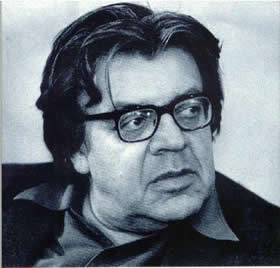
Erich Fried (6 mei 1921 22 november 1988)
De Japanse schrijver Yasushi Inoue werd geboren op 6 mei 1907 in Asahikawa. Zie ook alle tags voor Yasushi Inoue op dit
blog.
Uit: Almost Transparent Blue (Vertaald
door Nancy Andrew)
I
took a fragment of glass about the size of my thumbnail out of my pocket and
wiped the blood off it. The little fragment with its smooth hollow reflected
the brightening sky. Under the sky stretched the hospital and far away the
tree-lined street and the town. The horizon of the shadowy reflected town made
a delicate curving line. Its curves were the same, the same as the time I'd
almost killed Lilly on the runway in the rain, that white curved line that
burned for an instant with the thunder. Like the wave-filled foggy horizon of
the sea, like a woman's white arm, a gentle curve.
All
the time, since I didn't know when, I'd been surrounded by this whitish
curving.
The
fragment of glass with the blood on its edge, as it soaked up the dawn air, was
almost transparent.
It
was a boundless blue, almost transparent. I stood up, and as I walked toward my
own apartment, I thought, I want to become like this glass. And then I want to
reflect this smooth white curving myself. I want to show other people these
splendid curves reflected in me.
The
edge of the sky blurred with light, and the fragment of glass soon clouded
over. When I heard the songs of birds, there was nothing reflected in the
glass, nothing at all.
Beside
the poplar in front of the apartment lay the pineapple I'd thrown out
yesterday. From its moist cut end there still drifted the same smell.
I
crouched down on the ground and waited for the birds.
If
the birds dance down and the warm light reaches here, I guess my long shadow
will stretch over the gray birds and the pineapple and cover them.
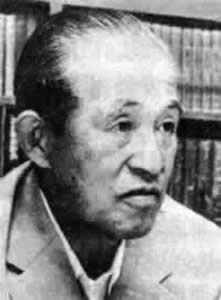
Yasushi Inoue (6 mei 1907 29 januari 1991)
De
Zweedse dichter en schrijver Harry Martinson werd geboren op 6 mei 1904 in
Jämshög in het zuidoosten van Zweden. Zie ook alle tags voor Harry Martinson op dit
blog
Cable Ship
We fished up the Atlantic cable betweeen
Barbados and Tortuga,
held up our lanterns
and patched over the gash on its back,
fifteen degrees north and sixty-one west.
When we put our ears to the gnawed part
we heard the murmuring of the cable.
One of us said: Its the millionaires in Montreal and St John´s
discussing the price of Cuban sugar
and the lowering of our wages.
We stood there long, thinking, in a lantern circle,
we patient cable-fishers,
then lowered the mended cable
back to its place in the sea.
Vertaald door Robin Fulton
Listeners
I was small in the days of
listening
the old ones sat around the hearth
rocking their supposed sins toward
the final day, when a
crucified saviour would wash them clean.
The cat purred, the fire burned,
the chimney dampers howled,
someone sang the blows and lamented the song
about the maid who stepped on the loaf of bread.
Late autumns toothless mouths told
of leprous marsh grain and
the bitter flower of the ergot.
I froze at my childhoods hearth.
Vertaald door Lars Nordström
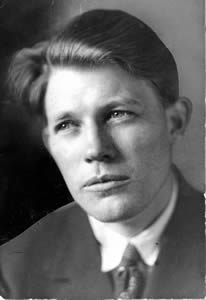
Harry Martinson (6 mei 1904 11 februari 1978)
Zie voor nog meer schrijvers van de 6e mei ook mijn blog van 6
mei 2012 deel 2 en ook deel 3.
06-05-2013 om 18:35
geschreven door Romenu 
Tags:Willem Kloos, Ariel Dorfman, Erich Fried, Yasushi Inoue, Harry Martinson, Romenu
|

